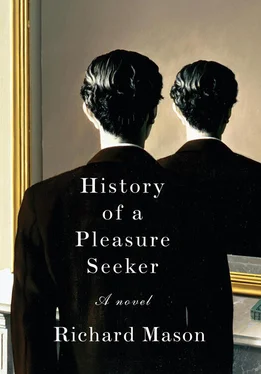“Thank you, mevrouw .”
“Je vous en prie.” She went to the door, but hesitated before unlocking it. “We should wait until you are presentable.”
“Yes, mevrouw .”
But erections are harder to suppress the harder one tries, and in the face of Jacobina’s scrutiny Piet’s stubbornly obeyed this law. This fact was tremendously gratifying to her. Eventually, with a laugh she had last given as a girl of twenty-two, she took from a bookcase a large, privately published history of the Amstel Hotel and handed it to Piet Barol. “It would be advisable for you to know something of Mr. Vermeulen-Sickerts’ business interests,” she said briskly. And with that she unlocked the door and stepped onto the landing.
Piet followed her, the volume carefully positioned to hide his embarrassment. By the time he reached the attic floor of Herengracht 605 he no longer had need of its assistance to preserve a modest silhouette. He closed his door and lay on his bed, observed by the photograph of his mother. He turned away from it. The heady exhilaration of three glasses of wine and two of champagne had lifted and been replaced by a dull, insistent throbbing at his temples. He was not a man much given to bouts of conscience and had he not been fond of Maarten Vermeulen-Sickerts he might have experienced none on this occasion. But as he stared at the ceiling, the last embers of pleasure died and a chill horror crept over him.
It was one thing to have flirted with Jacobina before meeting her husband, quite another to insult him now that he lived in his house and wore his clothes. Piet was accustomed to holding himself in high regard. He did not at all enjoy feeling like a cad and thought — too late! — of Epicurus’ advice to consider the full consequences of a hedonistic act before embarking on it. He could not deny the intensity of the hedonism. Who would have thought that a woman so universally well regarded was capable of sinning with such abandon?
He got up and went to the mirror above the writing desk. His lips were slightly swollen. “You are not to do that again,” he told his reflection. But even as he spoke, he doubted his resolve, because he knew that his conscience was insufficiently exercised to prevail over his pleasure impulse in fullest sail. He repeated himself sternly, felt ridiculous and considered praying for strength. But he did not. It seemed foolish to draw attention to himself at a moment of such disadvantage, if indeed there was a God.
Instead he undressed and had a bath and was glad that Didier was not there to question him from the radiator. In the warm water his cock demanded satisfaction, and when this had been achieved he felt better. He got out and dried himself, rinsed the tub, and dressed. Then he told Mrs. de Leeuw he would not be dining in and spent half a guilder on roast beef and pickles, which he consumed meditatively on the terrace of a café on the Leidsegracht as the shimmering evening stole away and he wondered what on earth he was to do.
The decision Piet Barol reached was this: as soon as possible, while still in the grip of somber good intentions, he should perform for Jacobina the speech of the young believer, racked by religious scruple, that he had prepared for Constance but not had occasion to employ.
He went to see her at eleven the next morning, having set Egbert twenty lines from Paradise Lost to translate into Dutch. Jacobina was in the private salon, answering letters at a dainty escritoire that had once belonged to Madame de Montespan. She, too, had been wondering how best to behave after the wordless excesses of the previous afternoon, but she had reached a different conclusion from Piet Barol’s.
“I would be grateful,” she said coldly as he entered, “not to be disturbed. If you wish to be of service, you may present yourself at five o’clock in the same place in which you were so useful yesterday.”
She returned to her letter, thrilled by her audacity. Jacobina did not at all wish to take a lover, and her conscience drew the line at verbal intimacies with a man who was not her husband. What she wanted was more, a great deal more, of the physical pleasure to which Piet had introduced her. She did not deem it necessary to dismantle the social barriers between them in order to achieve this end; in fact, their inequality was useful to her.
Piet was rarely rendered speechless, but now his little soliloquy evaporated. “I have lived all my life in the shadow of a church, madam,” he began, reaching after it clumsily. “God has been ever present to me. His will—”
“Your domestic arrangements do not interest me, Mr. Barol.” Jacobina touched an electric bell on the wall and returned to her letter.
“ Mevrouw …”
“I am a believer in actions over words.” Jacobina continued to write. “If you are not at liberty this afternoon, I will quite understand. Though I confess”—and now she smiled at him—“that I should be a little disappointed.”
Hilde Wilken knocked at the door, entered and curtsied.
“Please ask Monsieur la Chaume to come up and send some pear cordial with him. It’s terribly hot today.”
“Yes, madam.”
“Thank you, Hilde. And thank you, Mr. Barol. You may both go.”
As Piet went down the stairs, he found himself impressed and aroused by Jacobina’s manner. He had never encountered patrician disdain from a conquest and it was highly stimulating. He waited until Egbert had finished his translation, then checked it and set him another, all the while valiantly supporting his conscience in its struggle against more animal instincts.
As they worked, Egbert’s passivity and pampered helplessness began to exasperate him. He might have taken a normal boy to the Vondelpark and played chase with him until it was dark and the danger had passed. He understood that if he did not keep his rendezvous with Jacobina she would never again suggest one. But he could not leave the house and this left him in uncomfortable proximity to temptation.
The only available remedy was preemptive self-relief, but this had its dangers too. Piet knew well that desire peaks in the moments before it dies, and the dispassionate mood that succeeds a climax did not always last long with him. He feared it would not last long at all in this instance. He waited until a quarter to five. Then he sent his charge to have his supper, locked himself in the entrance hall cloakroom, and opened his flies. Images of Jacobina rose irresistibly. He took himself to the brink, but this state is the riskiest of all; and though he knew that he should, and wished earnestly that he would, he could not bring himself to abandon it.
His conscience, having done its best, abruptly gave up in the face of insuperable odds. He buttoned his flies and washed his hands and went upstairs.
Six weeks later, Constance Vermeulen-Sickerts turned twenty-two. The hospitality dispensed to celebrate this occasion was high and generous, and ostentation was not its chief motivation. Good nature was, because it pleased the Vermeulen-Sickertses to please others. That their guests would also be impressed was not the point of the enterprise, merely its inevitable by-product. A dance was given for two hundred, and for several days before it the house was full of workmen in the green-and-white overalls of the Amstel Hotel, hauling palm trees, polishing glasses and rails and door knobs and the parquet boards of the sprung floor in the ballroom. The wall that divided this apartment from the pale gray and gilt music room, though seemingly as solid as any other, could be lowered into the basement by a system of ingenious pulleys. Piet watched it disappear with unconcealed admiration.
He wanted desperately to be invited and would have been annoyed to know how strenuously Jacobina had opposed her husband’s idea of including him. She did not at all relish the prospect of watching Piet flirt with her daughters’ friends, and her objections were so strident that Maarten became indignant. “This is the twentieth century, Jacobina,” he said one evening as, tight lipped, she brushed her hair before bed. “Piet Barol is an absolute gentleman. I will not have the snobberies of the past brought into my house.”
Читать дальше












